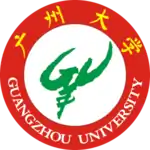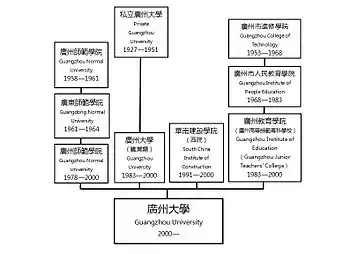Guangzhou University
Guangzhou University (GU; Chinese: 广州大学) is a state university in Guangzhou, capital of Guangdong province, China.
 | |||||||||||
| Motto | 博學篤行 與時俱進 | ||||||||||
|---|---|---|---|---|---|---|---|---|---|---|---|
Motto in English | Encyclopaedic studying, sincere practice, trend tide and welcome wave. | ||||||||||
| Type | Public | ||||||||||
| Established | 2000 | ||||||||||
| President | Wei Minghai | ||||||||||
Academic staff | 2401 | ||||||||||
| Undergraduates | 30390 | ||||||||||
| Location | , , China | ||||||||||
| Campus | Urban, 1.32 km² | ||||||||||
| Affiliations | Guangdong-Hong Kong-Macao University Alliance (GHMUA) | ||||||||||
| Website | english | ||||||||||
| Chinese name | |||||||||||
| Simplified Chinese | 广州大学 | ||||||||||
| Traditional Chinese | 廣州大學 | ||||||||||
| |||||||||||
The university is made up of two campuses. The major campus is located in Guangzhou Higher Education Mega Center (HEMC, geographically called Xiaoguwei Island), covering a total area of 131.7 hectares, with a building space of 596,000 square meters. The other campus is located in downtown (GuiHuaGang) of Guangzhou, covering 20 hectares.[1]
The university is dually affiliated to Guangzhou Municipal Government and Guangdong Provincial Government. The funding for the university is subject to Guangzhou Municipal Government.
History
Guangzhou University was reestablished in July 2000 by the Chinese Ministry of Education. It was a merger of five tertiary institutions previously known as Guangzhou Normal University (广州师范学院), South China Institute of Construction (华南建设学院), Guangzhou University (广州大学), Guangzhou Junior Teachers' College (广州高等专科学校), and Guangzhou Institute of Education (广州教育学院). The university is fully committed to consolidating and expanding its undergraduate program, graduate programs and international students program. The university comprises 27 schools (department). It offers 87 undergraduate programs with coverage of ten disciplinary fields, including philosophy, history, literature, law, pedagogy, art, science, engineering, management and economics. Currently, the university is authorized to run 3 PhD programs with 25 grade-2 subjects, 26 graduate programs with 95 grade-2 subjects. In addition, the university offers 9 professional graduate programs in 36 fields, including pedagogy, engineering, physical education, art and international Chinese language teaching.
The university has a teaching and research staff of 1475, including two academician of the Chinese Academy of Sciences and one academician of Chinese Academy of Engineering, 290 full-time professors and 604 full-time associate professors. The number of the full-time graduates and undergraduates is over 23,000.
The university is actively undertaking the national and provincial research programs, such as national “973”and “863” projects. It has established more than 30 research institutes or centers specializing in a wide range of subjects, including Interdisciplinary Research Center, Earthquake Engineering Research Test Center, Human Right Research Center, Research Institute for Computer Science & Software etc. International exchange and cooperation have always been a priority work of the university. Up to 2011, the university has established the partnership with more than 100 overseas institutions. The university is available for international students to study Chinese and apply for degree study. It also enrolls students from Hong Kong, Macao and Taiwan as well.
In the new age, the university is engaged in making a contribution to the development of Guangzhou, Guangdong Province as well as that of China. The goal of the university is to mold itself as a comprehensive university with a unique characteristic and ranks in a leading position among the universities of similar type.
Campus
As a manifestation of GU's core spirit, the Campus Culture of GU guarantees a good academic and cultural atmosphere on campus. To promote the construction of quality education, cultural activities on campus are organized on the basis of perfect combinations between science and humanity, between high taste cultural activities and students’ comprehensive quality cultivation.
Based on the principles of Students Art Troupe, GU carries on various cultural activities, including Culture and Art Festivals on Campus, Chinese Classics Reading, Classic Movies Appreciation, and Elegant Art Appreciation. In addition, the university organizes various contests including Debate, Image Design, Career Design, Singing and Dancing, Hosting, etc., and builds a series of school cultural activity brands.
There are now eighty student associations with more than 12,000 members at GU. These associations cover a range of subjects including humanities, technology, public service, arts, and P.E. etc. Each year, there is a cultural month reserved for activities of the associations in which student associations play an important role in moral education, science enlightenment, career guidance, and volunteer service.[2]
Rankings and reputation
The new Guangzhou University is named after the third biggest city in China (Guangzhou) and was established in July 2000. It is actively undertaking the national and provincial research programs in recent years, such as national “973”and “863” projects.
The University Ranking on Academic Performance publications, authored by scholars from the Middle East Technical University in Turkey and co-contributed by European scholars from France, Netherlands and the United Kingdom ranked Guangzhou University at#153 out of the 183 nationally China and #1516 in ranking globally out of all the places of higher institutions in that category.
In the new age, the university is engaged in making a contribution to the community. The goal of the university is to mold itself as a comprehensive university with a characteristic and ranks in a leading position among the universities of similar type. [3]
Courses
While the undergraduate programs remain the dominant focus of its operation, GU also runs postgraduate programs. The university run 42 postgraduate programs and 62 undergraduate programs in eight fields of study including Literature, Science, Engineering, Economics, Management, Law, Education and History.
Departments and schools
| Schools | 学院 | Schools | 学院 |
|---|---|---|---|
| School of Architecture and Urban Planning | 建筑与城市规划学院 | School of Civil Engineering | 土木工程学院 |
| School of Business | 工商管理学院 | School of Economic and Statistics | 经济与统计学院 |
| School of Public Administration | 公共管理学院 | School of Education (Teachers’ School) | 教育学院(师范学院) |
| School of Environmental Engineering | 环境科学与工程学院 | School of Tourism (Sino-French School of Tourism) | 旅游学院(中法旅游学院) |
| School of Humanities | 人文学院 | School of Journalism and Communication | 新闻与传播学院 |
| School of Foreign Studies | 外国语学院 | School of Physical Education | 体育学院 |
| School of Fine Art and Artistic Design | 美术与设计学院 | School of Chemistry and Chemical Engineering | 化学化工学院 |
| School of Mathematics and Information Sciences | 数学与信息科学学院 | School of Physics and Electronic Engineering | 物理与电子工程学院 |
| School of Geographic Sciences | 地理科学学院 | School of Electro-Mechanical Engineering | 机械与电气工程学院 |
| School of Computer Science & Education Software | 计算机科学与教育软件学院 | School of Life Science | 生命科学学院 |
| School of Music and Dance | 音乐舞蹈学院 | School of Politics and Civic Education | 政治与公民教育学院 |
| School of Law | 法学院 | School of International Education | 国际教育学院 |
| School of Basic Education | 基础教育学院 | School of Modern Industry | 现代产业学院 |
| CIBT International College | 中加国际教育学院 | Wesleyan College | 卫斯理安学院 |
| School of Continuing Education | 继续教育学院 | School of Teacher Training | 教师培训学院 |
School of Architecture and Urban Planning
- Architecture
- Architecture(Environment Design Orientation)
- City Planning
- City Planning(Landscape Orientation)

School of Civil Engineering
- Building Environment and Energy Utilization Engineering
- Civil Engineering
- Traffic Engineering
- Water-supply and Drainage Science and Engineering
School of Business
- Business Administration (Cooperative Program) (Experimental)
- Business Administration
- Electronic Commerce
- Engineering Management
- Human Resource Management
- Logistics Management
- Marketing
School of Law
- Law(Lawyer Orientation)
- Law
School of Public Administration
- Administrative Management
- Management of Public Services (Urban Management Orientation included)
- Social Work
School of Education (Teachers’ School)
- Applied Psychology
- Educational Technology (Teacher's school)
- Pedagogy (Chinese Teaching in Primary School)
- Pre-school Education
- Psychology (Teacher Education)
School of Humanities
- Chinese Language and Literature
- History
- Teaching Chinese as a Foreign Language
School of Journalism and Communication
- Advertising
- Broadcast and Host (Mandarin & Cantonese)
- Broadcasting Science (Network Communication)
- Radio and Television Broadcasting
- Radio-TV Program Production and Direction
School of Foreign Studies
- French Language
- English Language
- Japanese Language
School of Music and Dance
- Choreography
- Musicology
School of Fine Art and Artistic Design
- Visual Communication Design
- Painting
- Environmental Design
- Fine Arts
- Product Design
- Clothing and Fashion Design (Including Clothing Model Perform)
- Animation
School of Chemistry and Chemical Engineering
- Chemical Engineering
- Chemistry
- Food Science and Engineering
School of Mathematics and Information Sciences
- Information and Computing Science
- Information Security
- Mathematics and Applied Mathematics
School of Physics and Electronic Engineering
- Electronic Information Science and Technology
- Internet of Things Engineering
- Optoelectronic Information Engineering (Optoelectronic Testing Orientation Included)
- Physics (Education)
School of Geographic Sciences
- Geographic Information Education
- Geographic Science Education
- Human Geography & Urban and Rural Planning
- Physical Geography and Resource Environment
School of Electro-Mechanical Engineering
- Mechanical Design, Manufacture, and Automation
- Electrical Engineering and Automation
- Electronic Information Engineering
- Industrial Design
- Telecommunications Engineering
School of Computer Science & Education Software
- Computer Science and Technology
- Network Engineering
- Software Engineering
School of Life Science
- Biological Engineering
- Biological Science
- Biotechnology
School of Environmental Engineering
- Environmental Engineering
- Environmental Science
School of Tourism (Sino-French School of Tourism)
- Exhibition Economy Management
- Tourism Management (Domestic programs)
- Tourism Management (Sino-France project)
School of Physical Education
- Administrative Management
- Management of Public Services (Urban Management Orientation included)
- Social Work
School of Politics and Civic Education
- Ideological and Political Education
School of Economic and Statistics
School of International Education
School of Teacher Training
School of Basic Education
School of Modern Industry
CIBT International College
Wesleyan College
Staff and students
GU has a staff of 2,588 including one academic scholar from the Chinese Academy of Science, one academic scholar from the China Institute of Engineering, four academic scholars employed on a part-time basis, 20 supervisors of doctoral students, 130 full-time professors, 567 associate professors; of whom all 100 are Ph.D holders, 32 who have been awarded the state Council Special Allowances, 14 provincial and municipal level experts. The University's current full-time postgraduates, undergraduates and diploma students number 17,000. The University enrolls students mainly from Guangdong Province and Guangzhou, but also admits students from 11 other provinces, Hong Kong, Macao and also from overseas.
Research centres and other partnerships
The University has 57 research institutes and centers specializing in wide range of fields including the Institute of Educational Software, the Earthquake Engineering Research and TestCenter, the Institute of Educational Sciences, and the Institute of Advanced Manufacturing Technology.
GU has also established a number of cooperative educational establishments including the College of Textile and Garment, the College of Urban Construction Engineering, the College of Technology and Trade, Sontian College, Hua Ruan Software College, the School of Municipal Works and Construction. GU has established partnerships in a wide range of disciplines with universities and academic institutions of the United States, Australia, France, Russia, Italy, South Korea, Japan, Sweden, and the Chinese-speaking region including Taiwan, Hong Kong and Macau.
Prospects
With a history of over 10 years, and graduate programs since 2000, Guangzhou University has produced a large number of qualified talent for China and for Guangdong Province's social, economic, and technological development. The construction of the Guangzhou Higher Education Mega Center on Xiaoguwei Island (小谷圍島) is in progress.
References
- "Welcome to gzhu University". english.gzhu.edu.cn. Archived from the original on 2016-01-20. Retrieved 2016-03-17.
- "Welcome to gzhu University". english.gzhu.edu.cn. Archived from the original on 2015-08-31. Retrieved 2016-03-17.
- http://www.urapcenter.org/2011/country.php?ccode=CN&rank=all
- "2023 tables: Institutions - academic - Annual tables - Nature Index". Nature Index. Retrieved 9 August 2023.
- "2023 tables: Institutions - academic - Annual tables - Nature Index". Nature Index. Retrieved 9 August 2023.